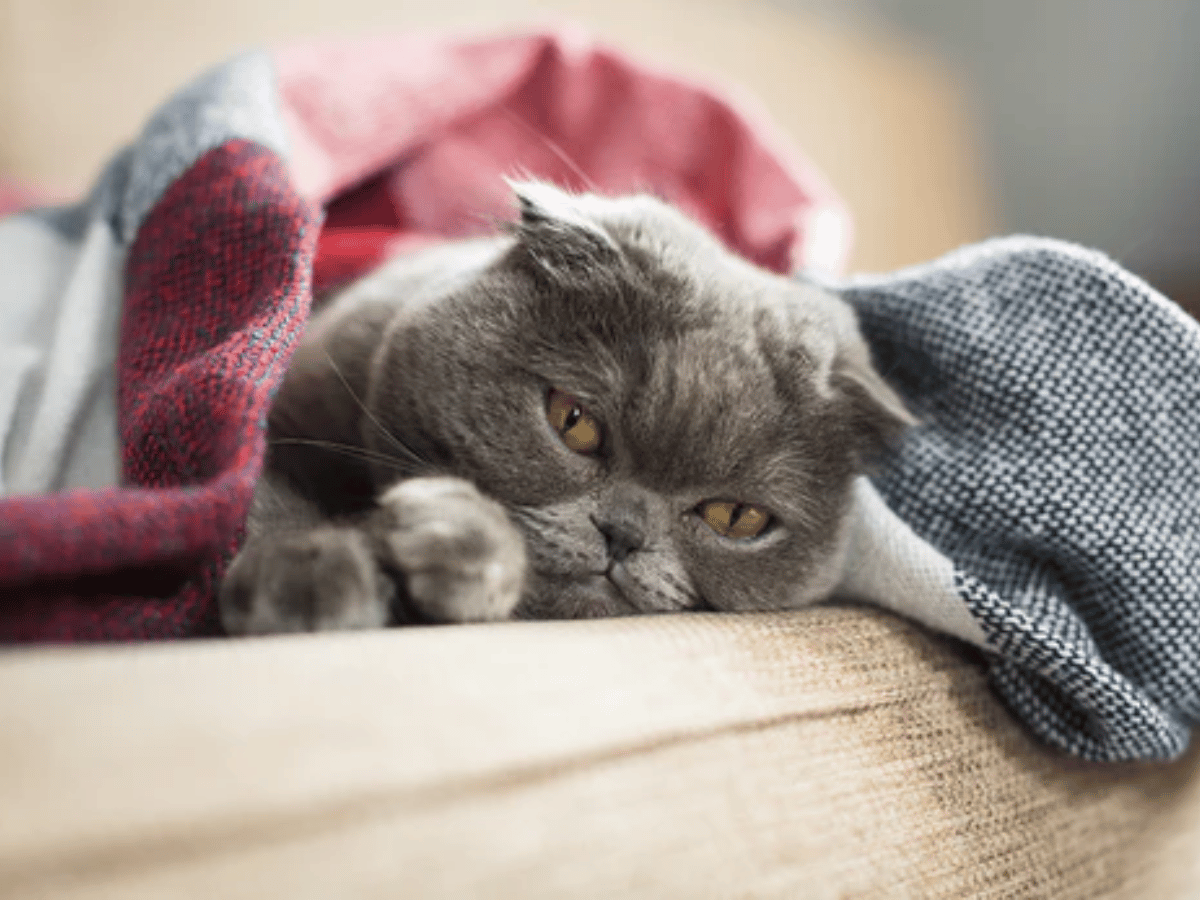
Lymphoma in Cats: Symptoms, Life Expectancy, and Alternatives 2025
Whenever one of our furry friends is sick, we naturally feel worried and concerned—and the mention of cancer can be devastating. If your cat has been diagnosed with lymphoma, your heart sinks at the thought of your beloved pet!
- Click to learn more: 👉 NATURAL product for your cat affected by CANCER. 🐱
At HomeoAnimo ™ , we know that you want the best for your pet, just like we do! We look forward to using our decades of experience and knowledge in the animal health industry to help you navigate this stressful situation and provide you with the information you need to make informed decisions about your cat's health.
In this article, we will discuss the types of feline lymphoma and its potential causes, as well as symptoms, life expectancy, and available solutions, including natural treatments.
I hope you find this article informative. Find out everything you need to know about cancer in cats in our comprehensive guide !
What is lymphoma in cats?

Lymphoma is a type of cancer that affects a type of white blood cell called a lymphocyte. These cells are found in lymph nodes throughout the body, which means that lymphoma can affect multiple areas of the body instead of just one location.
It is a very common cancer in cats, accounting for 30% of cancer diagnoses . Although it can affect any part of the body, the most common is a type of feline lymphoma that affects the gastrointestinal tract and accounts for about 2/3 of all cases: feline intestinal lymphoma.
Lymphoma in cats is often divided into categories based on the area of the body affected (intestinal, renal, or mediastinal), or by the size and severity of the cancer (small cell lymphoma or large cell lymphoma).
How common is lymphoma in cats?
Lymphoma is considered one of the most common feline cancers worldwide. PetMD even points out that it is "responsible for approximately 90% of blood cancers" in cats. Although this type of cancer can affect any feline, regardless of breed, age, and sex, it is more common in cats over ten (10) years old.
Furthermore, there is an important difference between feline lymphoma that affects a young cat and that which affects an older specimen. The disease often begins in the chest cavity in the former case, while it usually starts in the intestines in the latter.
Areas of the body most affected by lymphoma in cats
Although feline lymphoma is considered a systemic disease and can affect multiple parts of the body at once, it is not uncommon for it to specifically attack the following parts of the body: gastrointestinal tract, to the thoracic region and to the kidneys :
-
The gastrointestinal tract : It affects more than 50% of recorded cases of cats diagnosed with feline lymphoma and is prevalent in cats aged ten (10) years and older.
-
Thoracic Region : Technically called “mediastinal lymphoma,” it is often seen in young cats five (5) years of age or younger, and primarily affects the thymus and lymph nodes.
- Kidneys : This lymphoma is often closely related to feline leukemia and usually triggers long-term kidney failure as cancer cells continually take the place of healthy kidney cells.
What causes lymphoma in cats?

Lymphoma in cats can be caused by several factors such as age, genetics, or Feline Immunodeficiency Virus (FIV).
Here are the main causes and risk factors associated with lymphoma in cats:
1. Feline Leukemia Virus (FeLV) Infection
FeLV is one of the most well-known risk factors for lymphoma in cats. This virus can impair a cat's immune system and increase the risk of developing cancers, including lymphoma.
Although the prevalence of FeLV has declined due to vaccination and improved cat population management practices, it remains a major cause of lymphoma in infected cats.
2. Feline Immunodeficiency Virus (FIV) infection
FIV, often compared to HIV in humans, weakens the cat's immune system, which can also increase the risk of cancers such as lymphoma. Although the link between FIV and lymphoma is not as strong as that with FeLV, it remains a significant risk factor.
3. Exposure to Environmental Toxins
Some studies suggest that exposure to environmental toxins, such as pesticides or household chemicals, may play a role in the development of lymphoma in cats, although the evidence is not as strong as for viral infections.
4. Age and Genetics
Lymphoma is more commonly diagnosed in older cats, although it can occur at any age. Intestinal lymphoma typically affects cats over 10 years of age, while mediastinal lymphoma (affecting the lymph nodes in the chest) affects cats with an average age of 5 years.
There are also indications that certain genetic aspects may predispose some cats to lymphoma, but research on specific genetic markers is still ongoing.
5. Immune Factors
Conditions that compromise or affect a cat's immune system can also increase the risk of developing lymphoma. This includes certain autoimmune diseases or chronic conditions that affect immune regulation.
It is important to note that, despite knowledge of these risk factors, many cases of lymphoma occur without an identifiable cause, making the cancer difficult to specifically prevent.
What are the symptoms of lymphoma in cats?

General symptoms of lymphoma in cats include weight loss, lethargy, and intermittent fever. More specifically, lymphoma in cats is a type of cancer that can affect different organs and tissues, causing a variety of symptoms depending on the location of the disease .
Here are some of the most common symptoms associated with lymphoma in cats:
1. Alimentary (Gastrointestinal) Lymphoma
- Loss of appetite and weight loss
- Vomiting
- Diarrhea
- Lethargy
- Palpable abdominal mass or abdominal distension
2. Multicentric (Generalized) Lymphoma
- Enlargement and inflammation of the external lymph nodes, often palpable under the skin
- Fever
- Lethargy
- Weight loss
3. Mediastinal (Thoracic) Lymphoma
- Breathing difficulties or shortness of breath
- Cough
- Accumulation of fluid around the lungs (pleural effusion)
- Apathy
4. Skin Lymphoma
- Lesions or lumps on the skin that may be ulcerated
- Itching
5. Renal Lymphoma
- Signs of kidney failure such as increased thirst and frequency of urination
- Bloody or cloudy urine
- Lethargy
- Weight loss
Symptoms can often be subtle at first and become more obvious as the disease progresses. If a cat shows emergency signs such as severe breathing difficulties, extreme lethargy, or collapse, it is crucial to seek immediate veterinary attention.
Small Cell Lymphoma vs. Large Cell Lymphoma in Cats
Small cell lymphomas in cats grow more slowly than large cell lymphomas. This means that symptoms may not be as noticeable, and when diagnosed, these lymphomas also tend to be less aggressive.
How to fight lymphoma in cats?

Here are the main treatments used to treat and increase the chances of recovery from lymphoma in cats:
Chemotherapy
Chemotherapy involves the use of anticancer drugs to kill cancer cells or slow their growth. It can offer a significant chance of cure, especially when administered early. Chemotherapy can be administered orally, intravenously, or even directly into the affected area (intracaviary chemotherapy).
Radiotherapy
Radiation therapy may be used in some cases, especially when the lymphoma is localized or to treat specific symptoms such as a lump that is causing discomfort or functional problems. This technique uses high-energy rays to target and kill cancer cells, which can cure or significantly reduce the symptoms of the disease.
Corticosteroids (Cortisone)
Corticosteroids, such as prednisolone, are commonly used to treat a cat with lymphoma, either in addition to chemotherapy or alone in cases where chemotherapy is not an option. Corticosteroids have an anti-inflammatory effect and can help treat and shrink lymphoid tumors, increasing the chances of recovery and life expectancy.
Surgery
In some cases, especially when the lymphoma is very localized, surgery may be used to remove tumors. However, because lymphoma tends to spread quickly and widely, surgery is not always a viable option to completely eliminate the disease.
Are there any natural treatments to support a cat with lymphoma?

Here are some natural treatment options for lymphoma in cats that can be discussed with your veterinarian:
1. Dietary Supplements
Omega-3 and essential fatty acids: These components can be added to your cat's diet to help reduce inflammation and improve overall health. Sources include fish oil and krill oil.
Probiotics: These can serve as a natural treatment to support gastrointestinal health, which is crucial for cats undergoing chemotherapy who may suffer from digestive upsets.
2. Plants and fungi
Turmeric (Curcuma longa): Known for its anti-inflammatory, antioxidant and anticancer properties , it can be used in small quantities.
Medicinal Mushrooms: Extracts of mushrooms such as Reishi or Shiitake are recommended as natural treatments for their potential role in strengthening the immune system. Specific mushrooms have been studied for their immunomodulatory, antioxidant, and potentially anticancer properties .
3. Acupuncture
This traditional Chinese practice can be considered as a natural treatment to help manage symptoms related to lymphoma and improve the cat's overall well-being.
4. Homeopathy
Many pet owners and alternative medicine practitioners may observe benefits in animals treated with homeopathy.

Therefore, in addition to conventional treatment options, there are natural solutions for lymphoma in cats. Before starting any natural treatment, it is essential to speak with a certified veterinary oncologist or alternative medicine specialist.
At HomeoAnimo™, we are on a mission to provide safe and effective natural alternatives to cancer in pets.
Consider the experience of Neko , a diabetic cat facing a dual diagnosis of lymphoma, affecting both the liver and intestines. After struggling with the side effects of chemotherapy, his owner decided to turn to an alternative approach.
Neko began receiving one of our natural products. Within two months, he showed remarkable signs of stabilization. His owner reports that, without chemotherapy, Neko not only stabilized his health but also showed encouraging improvements in his recent blood tests. Neko even gained weight, a positive sign of overall well-being.
"I highly recommend this product!" enthuses Neko's owner. This testimony adds a note of hope for other owners of cats with lymphoma who are looking for alternatives.
A natural solution for your cat

When dealing with cancer, the goal is to strengthen your cat's immune system to fight the disease and to combat and prevent recurrences!
PiptoAnimo (Cancer & Tumor Support) promotes a healthy response and boosts your cat's natural ability to fight disease. Furthermore, PiptoAnimo (Cancer & Tumor Support) can be used to maintain good health and help your feline cope with malignant or benign masses.
It is suitable for long-term use , regardless of the conventional treatments you choose to use, it can be taken alone or in conjunction with other treatment options.
We're just a phone call, chat, or email away to answer any questions you may have. We can also offer advice and help you make product decisions.
Watch our video:
What are the stages of lymphoma in cats?

Lymphoma in cats, as in humans, is often classified according to a staging system that helps veterinarians determine the extent of the disease and plan appropriate treatment. The most commonly used system for staging lymphoma in cats is based on the World Health Organization (WHO) criteria for lymphoma in dogs, adapted for felines.
Here are the different stages of lymphoma in cats:
Stage I
Single site: Lymphoma is limited to a single site, either a single lymph node or a single non-lymphoid organ (e.g., spleen, liver).
Stage II
Regional location: Lymphoma is present in several lymph nodes in a specific region of the body, but it is not widespread.
Stage III
Generalized: All peripheral lymph nodes are involved. This stage indicates more generalized disease that affects lymph nodes on both sides of the diaphragm.
Stage IV
Organ involvement: Lymphoma affects one or more major organs such as the liver or spleen, with or without lymph node involvement.
Stage V
Blood or bone marrow involvement: The lymphoma has spread to the blood or bone marrow, or has reached the central nervous system or other extra-lymphatic sites.
How long do cats with lymphoma live?

The life expectancy of cats with lymphoma depends on many factors, such as the location of the cancer and how quickly it was diagnosed and treated. Generally speaking, life expectancy ranges from 4 weeks to 2 years.
Here is a general overview of the outlook based on various factors:
Type of Lymphoma
- Large cell lymphoma (or high-grade B-cell lymphoma): This type is more aggressive but often responds well to chemotherapy. With proper treatment, the average life expectancy is usually 6 to 12 months, and some cats can live longer with a satisfactory quality of life.
- Small cell lymphoma (or low-grade T-cell lymphoma): Less aggressive and progresses more slowly than large cell lymphoma. Cats with this type of lymphoma can live for several years with continued treatment, often in the form of oral medications.
Stage of the Disease
- Early stages (I and II): Cats diagnosed and treated in these stages often have a better lifespan because the cancer is less extensive.
- Advanced stages (III to V): Life expectancy may be reduced, especially if the lymphoma has affected vital organs or the bone marrow.
General Health Status
- Good general health: Cats that are healthy, except for their lymphoma, tend to tolerate treatments better and may have a longer life expectancy.
- Other medical conditions: Comorbidities, such as kidney failure or diabetes, can complicate treatment and lead to a cat with lymphoma dying sooner.
Intestinal lymphoma in cats: life expectancy
Fortunately, the most common type of feline lymphoma, intestinal (or digestive) lymphoma, is often "low-grade" or small cell. With treatment, cats diagnosed with intestinal lymphoma have an average life expectancy of 1.5 to 2 years.
FAQ about lymphoma in cats

Does a cat with lymphoma suffer? Is it painful?
The short answer is no.
Pain and discomfort depend on the location and extent of the cancer. Fortunately, most cats treated for lymphoma generally do not experience significant pain.
Unlike other types of cancer, lymphoma causes very minimal discomfort and pain in cats. Perhaps the most significant pain a pet may experience during this disease is occasional abdominal bloating. However, toward the end of their life, a veterinarian may prescribe pain relievers to help them maintain some comfort.
How much does feline lymphoma treatment cost?
If you're referring to conventional medicine, the straightforward answer is that it depends. The price of prednisolone (a corticosteroid hormone) and chlorambucil (an oral chemotherapy drug) can vary depending on the source. As for radiation therapy, the definitive option can cost at least $4,000, while its stereotactic equivalent can cost at least $5,000.
How long can a cat live with lymphoma without treatment?
Feline lymphoma is a serious disease that can significantly shorten a cat's life if it does not receive immediate care and attention. Statistics show that cats with this health condition tend to survive less than two (2) months once diagnosed and without adequate support.
It is essential to remember that giving your feline adequate natural support such as PiptoAnimo (Cancer & Tumor Support) can help strengthen your overall immune system, as well as promote your body's resistance to lymphoma.
Is feline lymphoma contagious to other cats?
The short answer is no.
Feline lymphoma is not contagious and cannot be transmitted to another feline or to humans, contrary to popular belief. However, as previously explained, cats exposed to feline immunodeficiency virus (FIV) and feline leukemia virus (FeLV) are at higher risk of contracting this disease.
It is important to note, however, that both FIV and FeLV are highly contagious, as they are easily transmitted from cat to cat through biting and exposure to contaminated objects such as collars, food bowls, and litter boxes.
How aggressive is lymphoma in cats?
Interestingly, the “aggressiveness” of feline lymphoma depends on three (3) key factors, described below:
- First, the particular type of lymphoma the cat has.
- Second, where it is present in the animal's body.
- And third, the speed with which the lymphoma was discovered and treated appropriately.
How to feed a cat with lymphoma?
If your cat has lymphoma, consider a low-carb, high-protein diet. It's also not recommended to include grains in your pet's regular diet, as they can unintentionally "feed" the cancer cells.
Conclusion
Did you find this article helpful and informative? What is your experience with lymphoma in cats? Leave a comment and feel free to share this article with your friends and family so other pet owners can be informed too!
If you're concerned that your pet may be suffering from a health issue, our Free Pet Health Referral can help. In addition to receiving advice and recommendations from our Natural Health Advisors, they'll also guide you through the products and treatment options that best suit your pet's health needs.




















10 comments
Bonjour Sylvie :) Je comprends bien votre stress. Nous avons communiqué par email au sujet de PIPPA. En effet, pas de problème pour utiliser notre produit. La date de péremption n’est pas passée et il ne fait pas obligatoirement le conserver au frigo : un endroit frais et sec est très bien. Camille de HomeoAnimo.
HomeoAnimo
Bonjour
Notre Minette a un ganglion sous maxillaire très dur. Elle miaule très roque depuis quelque mois. Le veto a décidé de faire une ponction du ganglion et une prise de sang. En attendant le verdict, puis je lui donner du pipto, commandé chez vous en prévention (les délais de reception etant assez long) dont la date de péremption est 2026 mais que je n’ai pas mis au frais car je n’avez pas lu vos mises en garde. Je vais en recommander de toute manière.
Merci de votre réponse
Sylvie, une maîtresse très angoissée comme toutes les maîtresses de boules de poil.
Sylvie MARTIN
Bonjour Hasni, nous vous remercions d’avoir partagé votre expérience avec nous tous. Nous comprenons la douleur et l’inquiétude que vous ressentez. Nous continuons d’être en contact avec vous via l’email pour vous aider avec le traitement de votre chat. Bien à vous, L’équipe de Homeoanimo
Homeoanimo
Bonjour Hasni, nous vous remercions d’avoir partagé votre expérience avec nous tous. Nous comprenons la douleur et l’inquiétude que vous ressentez. Nous continuons d’être en contact avec vous via l’email pour vous aider avec le traitement de votre chat. Bien à vous, L’équipe de Homeoanimo
Homeoanimo
Bonjour,
Fin février mon chat étant mal j’ai consulter le vétérinaire et après prise de sang j’ai découvert que le taux des globules blanc sont élevés.
Plus tard mois de mars j’ai repris rdv et il l’a consulter ces les lymphomes qui a grandit plus part rapport à février je commandes il y a 3 jours votre produit en attendant.
Je le nourrit à la seringue comme nourriture hill’s one care et urgent care à côté je lui donne du fortifier félin,nutri plus gel et seraquin oméga pour lui redone de la force.
Car il et faible il avait repris 100gr la semaine passée et a nouveau perdu que faire encore ? Car je le nourit chaque 1h avec une seringue 4cc ces dur mon chat a 11 ans
Merci
Hasni
Merci de nous contacter pour votre chat, Mme Brechelière. Nous allons vous répondre sous peu par email pour discuter en détails de sa santé et ainsi bien lui venir en aide. À bientôt !
Homeoanimo
Bonjour madame DROUET, merci d’avoir contacté Homeoanimo! Nous allons vous envoyer une réponse par email pour aider votre chat pour son lymphome. Nous espérons avoir de vos nouvelles bientôt. Passez une bonne journée!
Homeoanimo
Bonjour. Mon chat a une suspicion de lymphome digestif suite a une echographie eppaissiment de l intestin ou mici. . Traitement sous cortisone . Je voudrais trouver une alternative. Je vous remercie. Quel traitement me conseillez vous ?
Brecheliere Isabelle
Merci de nous contacter, Mme Lambrecht, au sujet du lymphome de votre chat. Nous allons vous faire parvenir un email afin de discuter plus en profondeur de la santé de votre chat et ainsi trouver des astuces pour lui venir en aide. À bientôt!
Homéoanimo
Bonjour, mon vétérinaire a diagnostiqué un “éventuel lymphome” chez mon chat (2 échographies effectuées) et il est traité via un corticoïde oralement, mais je souhaiterai savoir s’il existe d’autres traitements curatifs car malgré la reprise de son appétit grâce à une pommade transdermique, il ne reprend pas de poids ! il a eu 10 ans en mai dernier et il est suivi régulièrement par mon vétérinaire . Je viens vers vous car c’est mon ultime espoir et je crois encore aux “miracles” ! Merci de bien vouloir me donner quelques conseils.
Mamygeo
GEORGETTE DROUET
Leave a comment
This site is protected by hCaptcha and the hCaptcha Privacy Policy and Terms of Service apply.